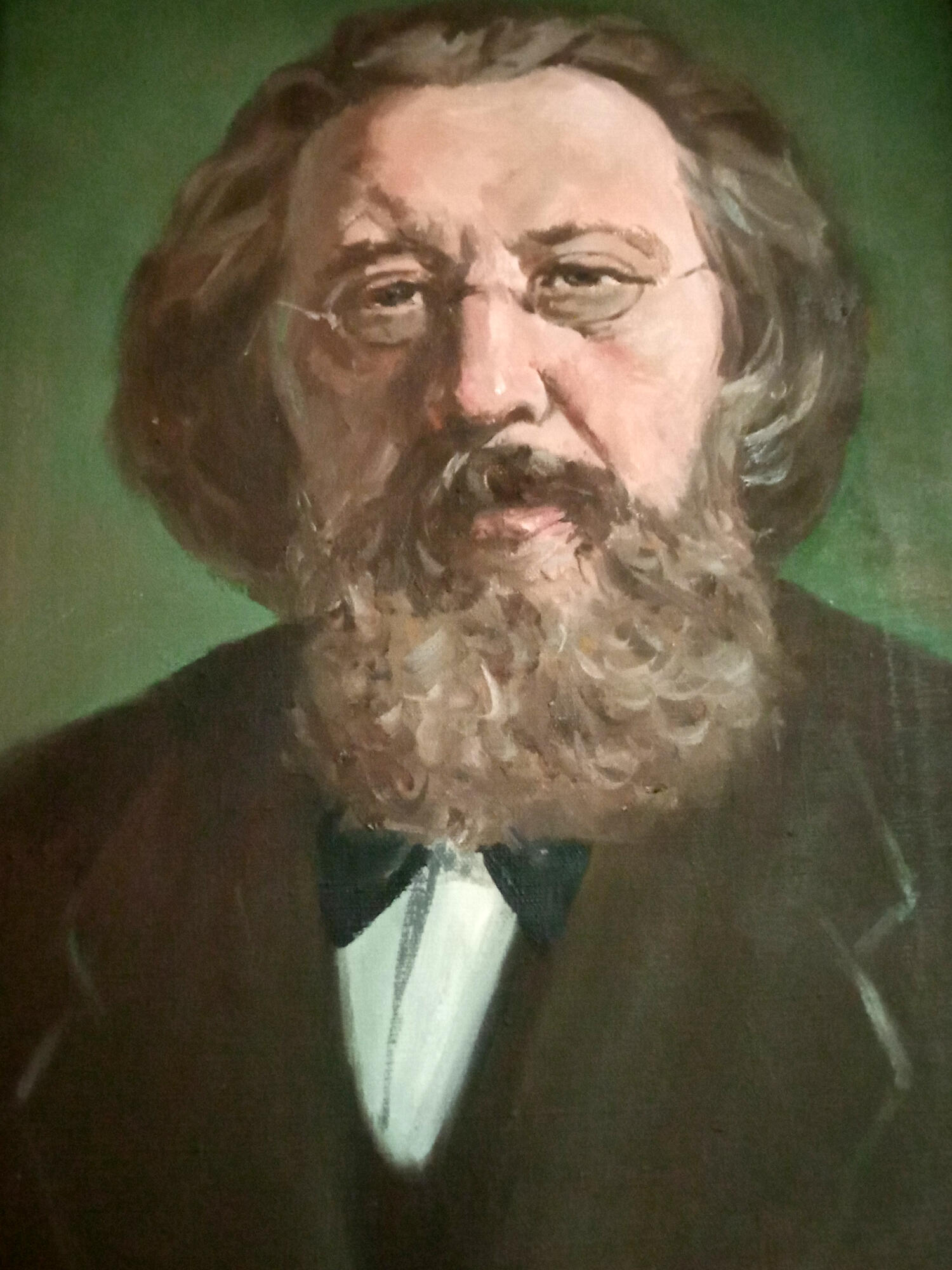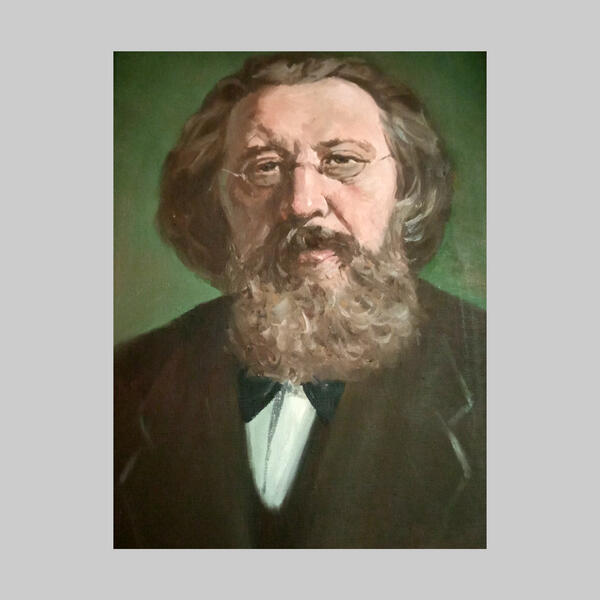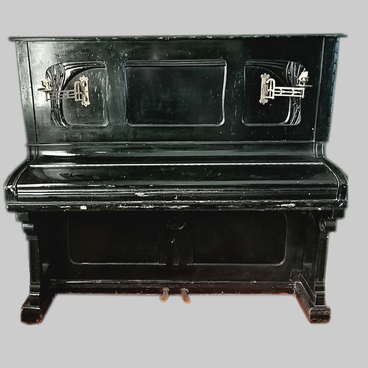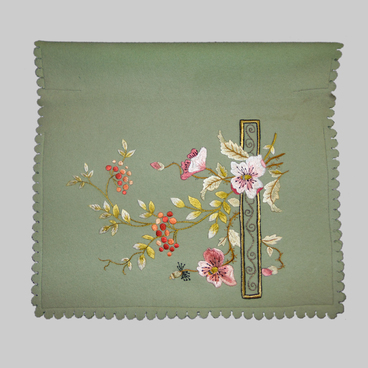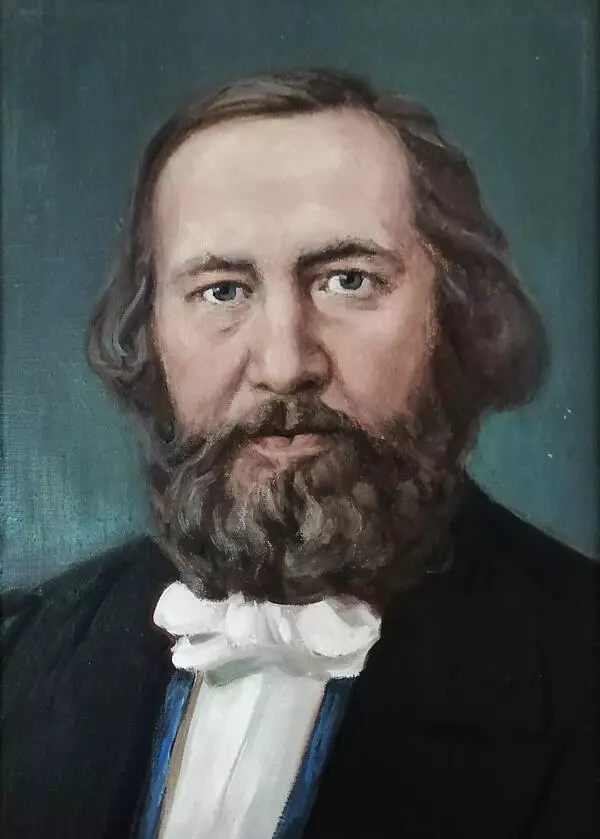This portrait, painted by the Ufa artist Anatoly Platonov in the late 20th century, depicts Ivan Sergeyevich Aksakov, an outstanding Russian publicist, poet, public figure, one of the main ideologists of the Slavophilic movement and the writer Sergey Timofeevich Aksakov’s third son. This portrait is a fine detailed copy of a painting by the great artist Ilya Repin, who painted a half-length portrait of Aksakov in 1878, commissioned by the patron of arts Pavel Tretyakov.
In June 1878, Ivan Aksakov during his speech in the Slavophilic public organization, the Moscow Slavic Committee, harshly criticized the work of Russian diplomats at the Berlin Congress – an international meeting where the peace treaty following the Russian-Turkish war of 1877-1878 was revised. This speech, according to the historian Sergey Motin, “became the highest point of Aksakov”s journalistic activity, and brought him international fame and recognition of all Slavic nations that suffered from the Turkish and Austrian oppression.” However, it also brought him to vicious disfavor: by decree of Alexander II, he was expelled from Moscow.
Repin, who himself shared the people’s views, was sympathetic to Ivan Aksakov, so he gladly and enthusiastically took on Tretyakov’s order. The artist visited the village of Varvarino, the place of exile of the disgraced Slavophile, in Vladimir County, and painted his portrait. In 1880 the painting was exhibited at the First Exhibition of the Moscow Society of Art Lovers and was well appreciated. Now it is kept in the Tretyakov Gallery.
Ivan Aksakov was born in the autumn of 1823 in the village of Nadezhdino, Belebeevsky County, Orenburg Province (now the Republic of Bashkortostan). He is known most of all as a passionate follower of Slavophilia - a literary, religious and philosophical movement, supporters of which believed that Russia had substantial differences from Western countries. He argued, in particular, that “the state, obviously, is necessary, but one should not believe in it as the only goal and the highest norm of humankind. The public and personal ideals of humanity are above any state, just as conscience and inner truth are above the law and outer truth.”
In 1842 Ivan Aksakov in the rank of Titular Counselor took the post of Assistant Secretary in the 2nd Division of the 6th Criminal Department of the Senate. In 1845 he was appointed as Collegiate Assessor, and in the same year he was assigned a Comrade to the Chairman of the Kaluga Criminal Chamber. In May 1847 he was transferred back to the Moscow Senate as a Chief Secretary: first, in the 2nd, and in 5 months, the 1st branch of the 6th Department. It is known that he took the instructions of his superiors very seriously, and his reports were remarkable for their accuracy and refined presentation. In 1860, he fully focused on his work in the Slavic Committee. A few years after his return from exile in Varvarino, he passed away.
In June 1878, Ivan Aksakov during his speech in the Slavophilic public organization, the Moscow Slavic Committee, harshly criticized the work of Russian diplomats at the Berlin Congress – an international meeting where the peace treaty following the Russian-Turkish war of 1877-1878 was revised. This speech, according to the historian Sergey Motin, “became the highest point of Aksakov”s journalistic activity, and brought him international fame and recognition of all Slavic nations that suffered from the Turkish and Austrian oppression.” However, it also brought him to vicious disfavor: by decree of Alexander II, he was expelled from Moscow.
Repin, who himself shared the people’s views, was sympathetic to Ivan Aksakov, so he gladly and enthusiastically took on Tretyakov’s order. The artist visited the village of Varvarino, the place of exile of the disgraced Slavophile, in Vladimir County, and painted his portrait. In 1880 the painting was exhibited at the First Exhibition of the Moscow Society of Art Lovers and was well appreciated. Now it is kept in the Tretyakov Gallery.
Ivan Aksakov was born in the autumn of 1823 in the village of Nadezhdino, Belebeevsky County, Orenburg Province (now the Republic of Bashkortostan). He is known most of all as a passionate follower of Slavophilia - a literary, religious and philosophical movement, supporters of which believed that Russia had substantial differences from Western countries. He argued, in particular, that “the state, obviously, is necessary, but one should not believe in it as the only goal and the highest norm of humankind. The public and personal ideals of humanity are above any state, just as conscience and inner truth are above the law and outer truth.”
In 1842 Ivan Aksakov in the rank of Titular Counselor took the post of Assistant Secretary in the 2nd Division of the 6th Criminal Department of the Senate. In 1845 he was appointed as Collegiate Assessor, and in the same year he was assigned a Comrade to the Chairman of the Kaluga Criminal Chamber. In May 1847 he was transferred back to the Moscow Senate as a Chief Secretary: first, in the 2nd, and in 5 months, the 1st branch of the 6th Department. It is known that he took the instructions of his superiors very seriously, and his reports were remarkable for their accuracy and refined presentation. In 1860, he fully focused on his work in the Slavic Committee. A few years after his return from exile in Varvarino, he passed away.
